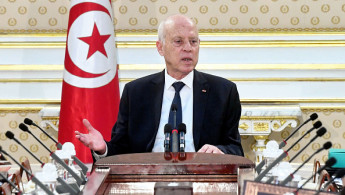Tunisia replaces interior, social affairs ministers in cabinet reshuffle
Tunisia's president abruptly replaced the interior and social affairs ministers Saturday night in a surprise cabinet reshuffle following a wave of arrests that has raised fresh fears for the health of the young democracy.
President Kais Saied named Khaled Nouri minister of interior, according to a statement from his office, replacing Kamel Feki, who had been considered close to the head of state.
Technocrat Kamel Madouri will be the new social affairs minister, replacing Malek Zahi, who was also seen as having the president's ear.
The reshuffle also created the new post of secretary of state overseeing national security under the interior minister, with Sofiene Ben Sadok named to the role, the statement said without elaborating.
The reshuffle comes on the heels of a string of arrests over the past two weeks of around 10 human rights activists, lawyers and journalists.
The European Union, the United States and former colonial power France have expressed concern at the arrests, drawing condemnations from Saied of "unacceptable foreign interference".
The reshuffle was announced a day after hundreds of Tunisians marched through the capital chanting "down with the dictatorship" as they protested against the recent arrests under a presidential decree critics say is being used to stifle dissent.
Two Tunisian media figures received one-year jail sentences on Wednesday after making comments the authorities deemed critical, in the latest prosecutions under Decree 54, a 2022 ban on "spreading false news".
"Down with the decree," the Tunis marchers shouted. "Dictator Kais (Saied), it's your turn now," they added, alluding to the Arab Spring uprising that toppled longtime dictator Zine El Abidine Ben Ali in 2011.
Saied was democratically elected president in 2019, but seized sweeping authority in a 2021 power grab and has ruled by decree since.
Since Decree 54 came into force, more than 60 journalists, lawyers and opposition figures have been prosecuted, according to the National Union of Tunisian Journalists.




 Follow the Middle East's top stories in English at The New Arab on Google News
Follow the Middle East's top stories in English at The New Arab on Google News


![A group of Palestinians, foreign and Israeli activists gather to participated in an olive picking event on the land in the town of Battir, which is under threat of confiscation by Israel in Bethlehem, occupied West Bank on 8 November 2024. [Getty]](/sites/default/files/styles/image_330x185/public/2182930803.jpeg?h=199d8c1f&itok=__0LgGsa)